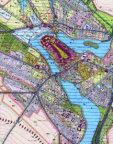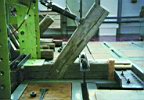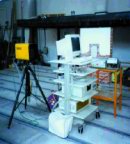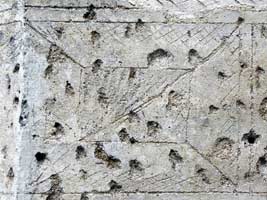Cordis web site  |
You can access ARCCHIP fact sheet on or |
|---|
 |
 |
 |
| ENVIRONMENTAL EFFECTS ON CULTURAL HERITAGE OBJECTS AND DIAGNOSTICS OF THEIR INTEGRITY DAMAGES | PLANNING AND MANAGEMENT TOOLS FOR HISTORIC CITIES AND TERRITORIES | HISTORIC STRUCTURES AND MATERIALS UNDER REPEATED LOADING |
 |
 |
 |
| SURVEY OF HISTORIC PAINTINGS BY MEANS OF MODERN NON-INVASIVE METHODS | FIBRE PLASTICS COMPOSITE AND NET REINFORCEMENT FOR HISTORIC MASONRY | EVALUATION OF COMPATIBILITY OF NEW RENDERS WITH HISTORIC RENDERS AND MASONRY |
Top of page
| Co-ordination, management an operation measures | CORNELIA |
| Advanced research workshops | ARIADNE |
| Medium term education activities | METEOR |
| Twining arrangements and visits | TACITUS |
| Special programmes | PATRIMONIA, HESTIA, GOLEM |
Structure of the workshops is based on position papers of invited top specialists with the aim to elaborate state of the art conclusions and to clearly formulate the most up-to-date problems in the area. Those documents and profound discussions will be utilised for establishment of core networks in those selected areas, in order to enable continuous co-operation and mutual information on the topics under discussion and creation of a virtual international centre for cultural heritage research.
Advanced Research Initiation Assisting and Developing Networks in Europe (ARIADNE) Workshops are used to prepare the most important deliverables of the project. They consist in 12 problem-oriented events lasting about one week, joining together invited and limited number of non-invited researchers specialised in one of the selected topics. The workshop conserves the same structure and work plan, which is be based on position papers of invited top specialists with the aim to elaborate state of the art conclusions and to clearly formulate the most up-to-date problems in the area. Those documents and profound discussions will be utilised for establishment of core networks in those selected areas, in order to enable continuous co-operation and mutual information on the topics under discussion. There will be invited about 20-25 general reporters who will present their position papers following given lines and summarising the situation in their countries. They will be asked to prepare basic data for a database which is operated in the Centre and supports the idea of a virtual international centre. The invited speakers are considered to be the main idea presenters for further collaborative research. They will cover all pre-Accession to the EU countries and respected experts or scientists from the EU countries. The workshops are open to other willing collaborators participating on a moderate fee basis, who could serve as potential solution providers or results receptors and practical applicators. The persons with support from other INCO 2 programmes will be preferred.| METEOR | (Medium Term Educational Opportunity and Research), represent 2 week training on clusters of up-to-date problems provided in the Centre under the support of leaders from EU and CEE countries and intended for participants mostly from CEE countries. They are completed with a possibility of 3 months stays for research students or researchers who are hosted by the Centre and worked on on-going research projects. |
| TACITUS programme | (Twining Arrangements and Research with Co-operating Institutions) enables visits or stays for research students or researchers from the EU or CEE countries in any of the co-operating institutions. |
| PATRIMONIA, HESTIA and GOLEM are aimed to enlarge scope of results with a wide practical application | PATRIMONIA - is aiming at the rise of cultural heritage awareness of people and understanding heritage protection as a part of total environmental protection. It is a project for youth, concentrated on cultural heritage in the relations between people, between mankind and Nature and between people and technology as a message for and source of approaches to sustainable development. |
| HESTIA - (Heritage for Economic and Social Stability and International Adhesion) is designed to prepare pilot programmes based on regional or micro-regional traditions, resources and technologies, in order to ensure economic and social stability and sustainability of small historic cities. | |
| GOLEM - (Gradually Optimised Low Energy Materials for construction in the CEEC) is intended to prepare pilot programmes based on traditional eco-efficient technologies and to increase awareness of citizens to cultural heritage and create a basis for small regional industry.) |
Page views: 1, last modified: March 28, 2025 08:55:46